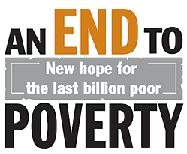
from the March 13, 2008 edition
The risks of fighting poverty too well
China's example raises tough questions about the real-world consequences of getting it right.
By Mark Lange
San Francisco - It's not difficult to imagine a world without extreme poverty. It would seem natural in an age with more broad-gauged wealth than has ever been seen in human history. But as the recent history of China shows, the prospect raises some tough questions.
Are the world's institutions actually ready for the massive shift entailed by lifting the last 1 billion people out of poverty? Do we fully understand the political and resource implications of being "too successful," as many believe and some fear China has been?
A closer look at China is important, because it's an extraordinary case. From 1981 to 2001, 400 million people there lifted themselves out of extreme poverty. Their numbers as a share of population fell from 53 to just 8 percent. Effectively, 80 percent of the world's progress in ending abject poverty has happened in China, independent of foreign aid.
Most of China's gains, according to the World Bank, registered in the first half of the 1980s, when rural families – impoverished after being forced into collective and incentive-free agriculture – were allowed to take responsibility for their farming. The encouraging lesson here is that astute agricultural development can be a life-saving first rung on the ladder to more diversified industry and export-driven growth.
But raising the floor raises new challenges. As absolute poverty in China declines, inequality is rising rapidly. If revolutions often grow in the shadow of rising expectations, the implications for China's remarkable progress are clear. An expanding and restive middle class may tolerate Beijing's restrictive governance only as long as the money flows. A significant slowdown could augur instability.
And for the rest of the world, China's breakthrough has brought serious if predictable environmental consequences, particularly an explosion in greenhouse gases. It's also triggered intense competition for resources, particularly oil, the pursuit of which has prompted China's lush sponsorship of the most savage and dysfunctional bottom-billion regimes in the world, from Angola to Sudan to Zimbabwe.
It's ironic, but for the last billion China has proved to be the most inspiring example and a direct brake on progress: First, by bringing in state investment that perpetuates many of the poorest nations' worst governance problems; and second, given China's seemingly endless supply of workers, by making it harder for poor nations to contribute labor and trade in world markets. Policymakers haven't learned how to mitigate these and many other unintended consequences of success.
Even if China's success in alleviating extreme poverty didn't present massive new challenges, many of the world's economic and aid institutions are themselves unwittingly set up to resist progress. Like almost any other organization, aid agencies, nongovernmental organizations, and contractors suffer from an inherent conflict of interest: They exist to run projects and perpetuate themselves – not to put themselves out of business. While individuals are deeply passionate about progress, institutions like things as they are – the bigger the problem, the bigger the operating budget.

